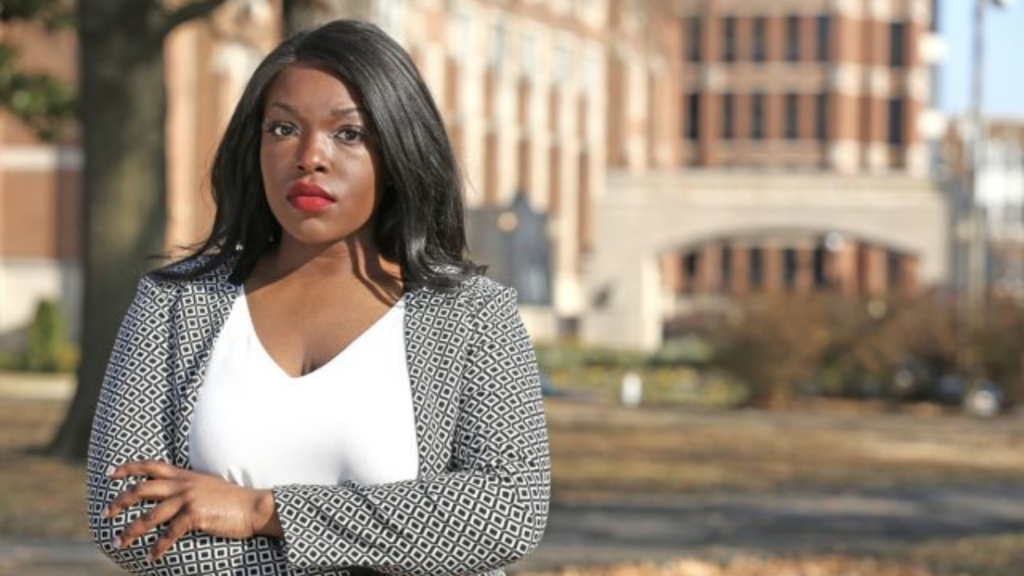Black student sues University of Tennessee: ‘Professional conduct rules are created to keep minorities out’
‘We are more than just pharmacists; we are people, we are mothers, sisters, and we should be able to fully engage in each of those roles without being shunned, judged, or persecuted.’
In her lawsuit against the University of Tennessee, graduate student Kimberly Diei hopes to create a lasting impact for students across the country.
Read More: OAN to pay MSNBC, Rachel Maddow $250K in defamation lawsuit
theGrio spoke with Diei and Greg Gruebel, a staff attorney with Foundation for Individual Rights in Education, for further details on their First Amendment case and the next steps in their legal action.
In conversation with theGrio, Diei shared more on her path to the university and her passion behind the program.
“What led me to the pharmacy program was the realization that it was the conversion point between science and chemicals and being able to directly relate to patients and patient care,” Diei shared. “I found UTHSC, and it was affordable and conveniently located. It’s actually the only school that I applied to because I’m confident in my capabilities. I was admitted. So I was not deemed unprofessional enough not to gain admittance, but now all of a sudden, there’s an issue.”

For Diei, a Black woman, the case is much more than free speech. Being reprimanded for tweets is a part of a larger societal issue that polices Black women and their right to exist in multiple aspects of life.
On Friday, theGrio reported Diei faced two investigations and an expulsion (since reversed) for her social media content. In the first instance, she was forced to write a letter reflecting on her “crude” and “sexual” posts to the College of Pharmacy’s professionalism committee.
During the second inquiry, the committee referenced tweets posted by Diei where she remixed the lyrics to Cardi B and Megan Thee Stallion‘s “WAP,” a song that itself faced criticism for its raunchy lyrics and video.
“As a Black woman, I don’t get to choose. I can only be one or the other. I can only be a professional, but I can’t also have my personal life where I engage in activities that mean something to me. And so I find it, again as a Black woman, I do feel like a lot of these professional conduct rules are created to keep minorities out because we do engage in our culture, and our culture is not always widely accepted by the mainstream until they find it interesting, or compelling, and then they bring it to the table as though they created it,” she remarked.
“For me to live in my truth, I’m automatically viewed as unprofessional or too sexual and things of that nature, which I totally disagree with. From birth, Black women are sexualized at younger ages, and then when we grow into our own and fully embrace our sexuality, then we’re told we’re wrong by the same society that has continuously chosen to sexualize us.”
Read More: Byron Allen settles $10B lawsuit with Charter Communications
Gruebel shared that this is not the first nor only time a university has attempted to reprimand a student for lyrics.
“I have seen administrators try to punish other students because of rap lyrics, specifically, like quoting rap lyrics,” he informed theGrio. “I’ve seen it a few times, that means there’s probably a lot more of that going on that we don’t actually see. Imagine you’re an 18-year-old student, and you tweet something [and] you quote a rap song, over the weekend and Monday you show up and your college advisor tells you that you need to take that down because it doesn’t look good or it’s unprofessional.”
Both Gruebel and Diei confirmed the university has not presented them with a copy of the allegedly violated code of conduct.

Diei insisted that her social media behavior would not hinder her professional growth and skills as a pharmacist. In fact, she declared the investigation into her Twitter expressions is indicative of a larger problem in the medical industry.
“I still believe the report was invalid and was filed maliciously, and that there are no grounds to dismiss me, yet they still pursue the issue simply because it’s their opinion that I’m too sexual. Being in healthcare sexuality is for many of our patients is something that is directly tied to their overall health. [We] dispense Viagara, [and other] medications that are to enhance and improve sexual performance. In a retail pharmacy, we have condoms, we have contraception products, we have lubrication products, [and] things of that nature all aimed at improving a person’s sexual experience,” she detailed.
Diei continued, “To say that I’m unprofessional simply for embracing my sexuality, yet you know you’re allowing others that pass such harsh judgment to continue on, that could negatively impact [the] patient. I don’t feel as though deeming me unprofessional is valid and there’s no clear nexus between anything I said or done and being able to be a successful pharmacist and treat patients, unbiasedly.”
Greubel stated the code of conduct should be updated to match modern times and the lawsuit.
“First Amendment law is difficult to really fit into this new 21st century, communication, and that happens on social media. Also, changing cultural norms to where Cardi B was on a Superbowl commercial, [and] Trina wasn’t on Superbowl commercials in the 90s. The world changed and that’s a good thing. It’s opening doors for a lot of people that they should have been open a lot longer ago,” he remarked.
Greubel continued, “Hopefully we can get the First Amendment to keep up with all the rapidly changing ways that people communicate and this idea of professionalism that anything that Kimberly was doing was, “unprofessional.” I think that it’s a good time in this country to have a discussion about what is and what is not professional.”
For Diei however, it’s bigger than her individual case. She hopes no matter the outcome, the legal action creates lasting change.
“Regardless of race, I want there to be a change so that students no longer have to fear using their voices inside or outside of the classroom. We are more than just pharmacists; we are people, we are mothers, sisters, and we should be able to fully engage in each of those roles without being shunned, judged, or persecuted. I’m hoping this will be a change for students everywhere who want to live their lives without being called unprofessional for doing what is normal to everyone, especially for people of color and Black women and Black men. I want them to stop using certain policies as a way to target Black individuals.”
According to Greubel, within the next 30 to 60 days, the university will have to respond to the lawsuit. It can respond with an answer to each allegation in the complaint, which will move the case into discovery. He and his team are then allowed to request specific information regarding the suspension, investigation, and policies.
“They can also file a motion to dismiss the lawsuit saying that we don’t have any legal basis for it, and then if they do that we’ll respond to it and we’ll let the judge decide who’s right.”
theGrio reached out to the university for their side of the story via email. Melissa Tindell, director of communications issued a response, saying “UT does not comment on pending litigation.”
Have you subscribed to theGrio’s new podcast “Dear Culture”? Download our newest episodes now!
TheGrio is now on Apple TV, Amazon Fire, and Roku. Download theGrio today!
The post Black student sues University of Tennessee: ‘Professional conduct rules are created to keep minorities out’ appeared first on TheGrio.

